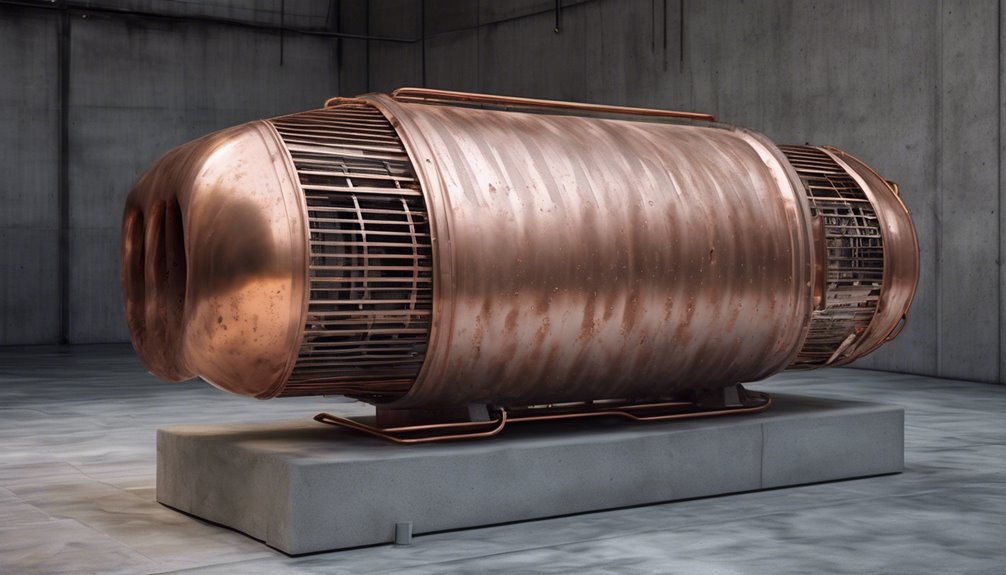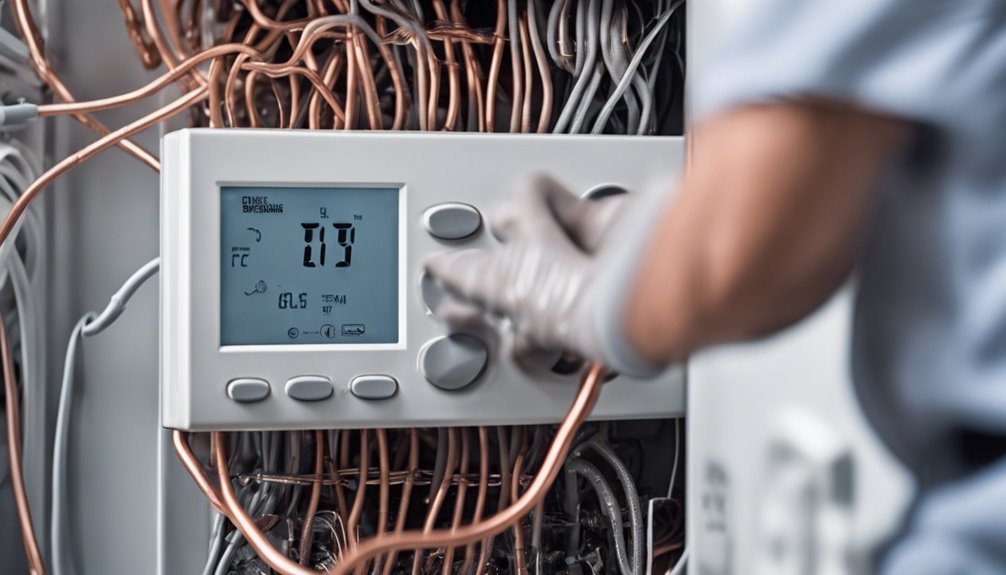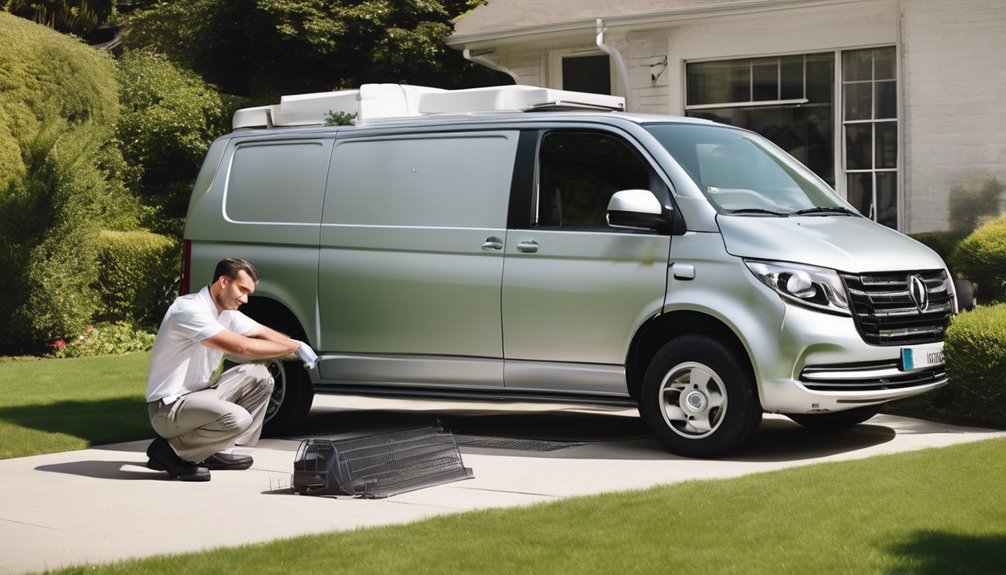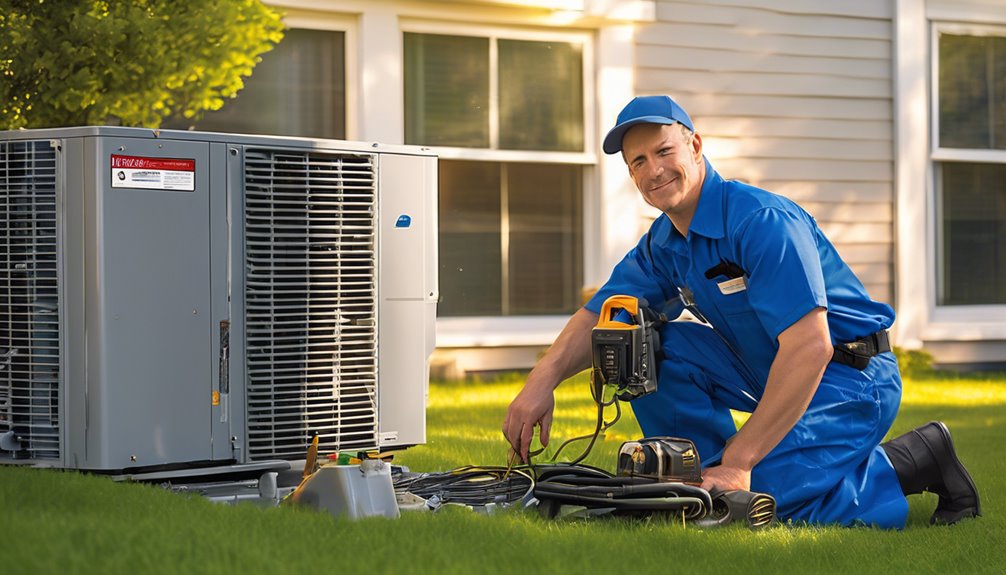When your AC compressor is humming along but your home remains sweltering, it's frustrating and puzzling. You're not alone – this issue is often caused by compressor overload, refrigerant leaks, faulty or blocked airflow, condenser coil problems, or thermostat and electrical issues. These common culprits can slash your AC's cooling power by up to 50%! Want to get to the root of the problem and cool down your space? Explore these potential causes further to uncover the solution.
Key Takeaways
- If the compressor is working but not cooling, check for refrigerant leaks or low charge, as this can cause inadequate cooling performance.
- Faulty or blocked airflow can be the culprit, so inspect air vents and filters for cleanliness and obstructions.
- Condenser coil issues, such as dirty fins or coil damage, can hinder heat dissipation and reduce cooling capacity.
- A faulty thermostat or electrical problem can prevent the compressor from receiving the proper signal to cool, so inspect electrical connections and sensors.
- Capacitor failure can prevent the compressor and fan motor from receiving necessary power, resulting in inadequate cooling.
Common Causes of Inadequate Cooling
When your AC compressor fails to cool, it's essential to identify the root cause of the problem to ensure effective repair.
You need to determine why it's not blowing cold air. One common cause is compressor overload, which occurs when the compressor is working too hard, causing it to overheat and reduce cooling performance.
Another possible reason is capacitor failure. The capacitor is responsible for supplying power to the compressor and fan motor. If it fails, the compressor won't receive the necessary power to operate efficiently, resulting in inadequate cooling.
Refrigerant Leaks and Insufficient Charge
You've checked for compressor overload and capacitor failure, but your AC compressor still isn't cooling.
Now it's time to investigate another common culprit: refrigerant leaks and insufficient charge. A leak in the system can cause the refrigerant to escape, leading to inadequate cooling.
Refrigerant leaks and low charge can be the root of inadequate cooling, so it's time to investigate these common culprits.
To identify the issue, you'll need to perform a refrigerant detection and leak inspection.
- Check the system's pressure gauge to see if it's low.
- Inspect the condenser coils, evaporator coils, and refrigerant lines for signs of leaks or damage.
- Use a leak-down test to identify where the refrigerant is escaping.
- Check the system's charge level and compare it to the manufacturer's specifications.
Faulty or Blocked Airflow
The airflow in your AC system plays a crucial role in dissipating heat, and any blockage or fault can significantly impede cooling performance.
You mightn't realize it, but dust accumulation on your air vents or filter obstruction can hinder airflow, causing your AC to work harder and reducing its cooling capacity.
Check your air vents and filters regularly to ensure they're clean and free from debris.
A dirty or clogged filter can reduce airflow by up to 50%, making your AC struggle to cool your space.
Condenser Coil Issues
Dirty condenser coils can be a silent killer of your AC's cooling performance, reducing its ability to efficiently dissipate heat.
When you neglect to clean your condenser coils, dirt and debris accumulate, causing dirty fins that block airflow and insulate the coil, making it harder for heat to escape. This can lead to coil damage, further decreasing your AC's cooling capacity.
Here are some common condenser coil issues to look out for:
- Dirty fins: Clean your condenser coils regularly to prevent dirt and debris buildup.
- Coil damage: Check for bent or damaged fins that can reduce airflow and heat dissipation.
- Poor airflow: Ensure proper airflow around the condenser coils by keeping the surrounding area clear.
- High pressure: Monitor your AC's pressure levels, as high pressure can be a sign of condenser coil issues.
Thermostat and Electrical Problems
Faulty thermostats and electrical issues can quietly sabotage your AC's ability to cool, leaving you sweltering in the heat.
You mightn't even realize there's a problem until it's too late. Check your thermostat for faulty relays or a malfunctioning sensor that prevents the compressor from getting the signal to turn on.
Don't wait until it's too late, inspect your thermostat for faulty relays or malfunctioning sensors to avoid AC breakdowns.
Tripped breakers or blown fuses can also prevent the compressor from working properly. Make sure to inspect your electrical connections for signs of wear or damage.
A faulty thermostat or electrical issue can be a simple fix, but it's essential to address it promptly to avoid further damage to your AC unit.
Frequently Asked Questions
Can a Dirty Air Filter Cause the AC to Not Cool?
You're wondering if a dirty air filter can be the culprit behind your AC's cooling issues. Yes, it can! A dirty filter reduces air quality and filter efficiency, blocking airflow and making your AC work harder, which can lead to reduced cooling performance.
How Often Should I Clean My AC Condenser Coils?
You should clean your AC condenser coils regularly, ideally every 2-3 months, as part of seasonal cleaning and coil maintenance to ensure optimal airflow and efficiency, and to prevent dirt buildup that can reduce performance.
Can a Faulty AC Capacitor Cause Cooling Issues?
You're wondering if a faulty AC capacitor can cause cooling issues – and the answer is yes! A bad capacitor can prevent the compressor and fan motor from working efficiently. You'll need to perform capacitor testing, and if it's faulty, consider capacitor replacement to get your AC running smoothly again.
Will a Thermostat Calibration Fix Cooling Problems?
You're wondering if a thermostat calibration will fix cooling problems. Calibration ensures sensor accuracy, but if temperature fluctuations persist, it might not be the solution you need, as other issues could be at play.
Can I Fix AC Cooling Issues on My Own?
You can attempt to fix AC cooling issues on your own by performing system checks and DIY troubleshooting, but it's essential to identify the root cause before diving in, as some problems may require professional expertise.
Conclusion
You've diagnosed the issue: your AC compressor is working, but your system isn't cooling. Now, it's time to take action. Check for refrigerant leaks, ensure proper airflow, and inspect the condenser coil. Don't forget to troubleshoot thermostat and electrical problems. By addressing these common causes, you'll be back to enjoying cool air in no time. Remember, prompt attention can prevent further damage and save you from costly repairs down the line.



